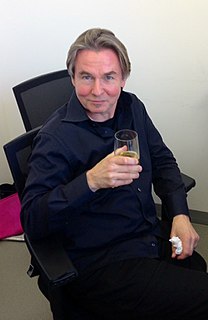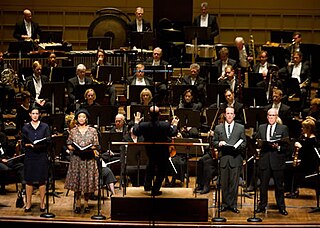Related Research Articles
Shulamit Ran is an Israeli-American composer. She moved from Israel to New York City at 14, as a scholarship student at the Mannes College of Music. Her Symphony (1990) won her the Pulitzer Prize for Music. In this regard, she was the second woman to win the Pulitzer Prize for Music, the first being Ellen Taaffe Zwilich in 1983. Ran was a professor of music composition at the University of Chicago from 1973 to 2015. She has performed as a pianist in Israel, Europe and the U.S., and her compositional works have been performed worldwide by a wide array of orchestras and chamber groups.

Esa-Pekka Salonen is a Finnish orchestral conductor and composer. He is principal conductor and artistic advisor of the Philharmonia Orchestra in London, conductor laureate of the Los Angeles Philharmonic, and music director-designate of the San Francisco Symphony.
Joan Tower is a Grammy-winning contemporary American composer, concert pianist and conductor. Lauded by The New Yorker as "one of the most successful woman composers of all time", her bold and energetic compositions have been performed in concert halls around the world. After gaining recognition for her first orchestral composition, Sequoia (1981), a tone poem which structurally depicts a giant tree from trunk to needles, she has gone on to compose a variety of instrumental works including Fanfare for the Uncommon Woman, which is something of a response to Aaron Copland's Fanfare for the Common Man, the Island Prelude, five string quartets, and an assortment of other tone poems. Tower was pianist and founding member of the Naumburg Award-winning Da Capo Chamber Players, which commissioned and premiered many of her early works, including her widely performed Petroushskates.
The Grammy Award forBest Instrumental Soloist(s) Performance was awarded from 1959 to 2011. From 1967 to 1971, and in 1987, the award was combined with the award for Best Instrumental Soloist Performance and awarded as the Grammy Award for Best Classical Performance – Instrumental Soloist or Soloists.
Alfred Whitford (Fred) Lerdahl is the Fritz Reiner Professor of Musical Composition at Columbia University, and a composer and music theorist best known for his work on musical grammar and cognition, rhythmic theory, pitch space, and cognitive constraints on compositional systems. He has written many orchestral and chamber works, three of which were finalists for the Pulitzer Prize for Music: Time after Time in 2001, String Quartet No. 3 in 2010, and Arches in 2011.
Aaron Jay Kernis is a Pulitzer Prize- and Grammy Award-winning American composer serving as a member of the Yale School of Music faculty. Kernis spent 15 years as the music advisor to the Minnesota Orchestra and as Director of the Minnesota Orchestra's Composers' Institute, and is currently the Workshop Director of the Nashville Symphony Composer Lab. He has received numerous awards and honors throughout his thirty-five year career. He lives in New York City with his wife, pianist Evelyne Luest, and their two children.

Steven Edward Stucky was a Pulitzer Prize-winning American composer.
Joseph Clyde Schwantner is a Pulitzer Prize-winning American composer, educator and a member of the American Academy of Arts and Letters since 2002. He was awarded the 1970 Charles Ives Prize.
Bernard Rands is a British-American contemporary classical music composer. He studied music and English literature at the University of Wales, Bangor, and composition with Pierre Boulez and Bruno Maderna in Darmstadt, Germany, and with Luigi Dallapiccola and Luciano Berio in Milan, Italy. He held residencies at Princeton University, the University of Illinois, and the University of York before emigrating to the United States in 1975; he became a U.S. citizen in 1983. In 1984, Rands's Canti del Sole, premiered by Paul Sperry, Zubin Mehta, and the New York Philharmonic, won the Pulitzer Prize for Music. He has since taught at the University of California, San Diego, the Juilliard School, Yale University, and Boston University. From 1988 to 2005 he taught at Harvard University, where he is Walter Bigelow Rosen Professor of Music Emeritus. For his notable students, See: List of music students by teacher: R to S#Bernard Rands.
Augusta Read Thomas is an American composer.
Christopher Chapman Rouse III was an American composer. Though he wrote for various ensembles, Rouse is primarily known for his orchestral compositions, including a Requiem, a dozen concertos, and six symphonies. His work received numerous accolades, including the Kennedy Center Friedheim Award, the Grammy Award for Best Classical Contemporary Composition, and the Pulitzer Prize for Music. He also served as the composer-in-residence for the New York Philharmonic from 2012 to 2015.
Dale Clevenger was the Principal Horn of the Chicago Symphony Orchestra from 1966 until his retirement in June, 2013. Before joining the CSO, he was a member of Leopold Stokowski's American Symphony Orchestra and the Symphony of the Air directed by Alfred Wallenstein. He was also principal horn of the Kansas City Philharmonic. He currently teaches at the Jacobs School of Music in Indiana University.
Atlanta Chamber Winds is the premiere ensemble of its type in the Southeast. Founded by Robert J. Ambrose in 2006, the group includes many of the finest professional wind players in Atlanta including members of the Atlanta Opera and Ballet Orchestras. The ensemble's core instrumentation consists of pairs of flutes, oboes, clarinets, bassoons, and horns, along with trumpet and trombone. Additional musicians supplement the group as the repertoire demands. As the only chamber wind ensemble in the metropolitan area, the Atlanta Chamber Winds provides a unique voice in the cultural landscape of the city.
The Clarinet Concerto is a concerto for clarinet and orchestra by the American composer Christopher Rouse. The work was commissioned for the Chicago Symphony Orchestra and its principal clarinetist Larry Combs by the Institute for American Music. It was completed December 11, 2000 and premiered May 17, 2001 at Symphony Center in Chicago with Christoph Eschenbach conducting the Chicago Symphony Orchestra. The piece is dedicated to Rouse's friend and fellow composer Augusta Read Thomas.
The Concerto for Orchestra is an orchestral composition by the American composer Joan Tower. The work was jointly commissioned by the St. Louis Symphony, the Chicago Symphony Orchestra, and the New York Philharmonic.
Soundings is an orchestral composition by the American composer Elliott Carter. The work was commissioned by the Chicago Symphony Orchestra for their final season with the conductor Daniel Barenboim as music director. It was first performed on October 6, 2005 at the Symphony Center, Chicago, by Barenboim and the Chicago Symphony Orchestra.
The Symphonia: sum fluxae pretium spei is an orchestral triptych by the American composer Elliott Carter. Its three movements were composed between 1993 and 1995. The complete work was first performed on April 25, 1998 at Bridgewater Hall, Manchester by the BBC Symphony Orchestra under the conductor Oliver Knussen. The second movement "Adagio tenebroso" was a finalist for the 1996 Pulitzer Prize for Music.
Campane di Ravello is a short orchestral composition by the American composer John Corigliano. The work was commissioned by the Chicago Symphony Orchestra for the 75th birthday of its then music director Georg Solti. Its world premiere was given by the Chicago Symphony Orchestra under the direction of Kenneth Jean on October 9, 1987.
Geoffrey Gordon is an American composer of classical music.
References
- 1 2 3 Thomas, Augusta Read (2005). "Astral Canticle". G. Schirmer Inc. Retrieved January 24, 2016.
- ↑ Rhein, John von (May 28, 2006). "Augusta Read Thomas 'leaps,' follows dreams". Chicago Tribune . Retrieved January 24, 2016.
- ↑ Oteri, Frank J. (April 16, 2007). "Ornette Coleman Recording Wins 2007 Pulitzer Prize in Music". NewMusicBox . Retrieved January 24, 2016.
- ↑ Delacoma, Wynne (March 12, 2013). "Augusta Read Thomas concerto to receive world premiere by Lynn Harrell and BSO". The Classical Review. Retrieved January 24, 2016.
- ↑ Seelye, Katharine Q.; Barron, James (April 17, 2007). "Wall Street Journal Wins 2 Pulitzer Prizes; History of Civil Rights Reporting Also Wins". The New York Times . Retrieved January 24, 2016.
- ↑ Rhein, John von (June 3, 2006). "Subject of death livens up part of CSO's performance". Chicago Tribune . Retrieved January 24, 2016.